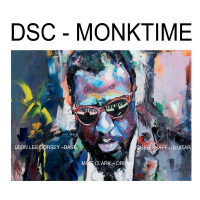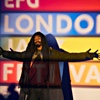Home » Jazz Articles » Album Review » DSC Band: Monk Time
DSC Band: Monk Time
"We pay tribute to the master in a context not normally associated with Thelonious Monk's music. It's a trio absent of saxophone and piano," Dorsey explains. "I felt from the start that with the chemistry of this band—there's no horn and no piano, the two instruments that defined Monk's sound—we could go to the magical music level."
It's no great revelation that even Monk's most "standard" tunes, such as "Blue Monk" or "Well You Needn't," can sound difficult or at least odd, and that playing such music on completely different instruments can at least potentially present additional challenges. But this trio approaches each tune with great skill and honorable intent, and their music is powerful.
Their production, jointly credited to Skaff and Dorsey, is too: The comfortable space around and between each instrument gives MonkTime an airy and spacious, cool jazz feel. For example, "Monk's Dream" is recorded so cleanly that it gives you the chance to hear the melody split between bassist Dorsey as the pianist's "left hand" and guitarist Skaff as his "right," with Clark's butterfly cymbals fluttering between to connect them both.
Taking on "Well You Needn't" as their opener quickly proves the band's chops. Skaff keeps churning ideas in a quicksilver sound that stitches together jazz and blues while bassist and drummer sound intuitively connected until Dorsey's bass solo climbs up and down inside Monk's construction. "Blue Monk" opens with Skaff's solo guitar see-sawing up and down its fretboard with a clean blues sound until the rhythm section tumbles in like a child trundling downstairs to greet Christmas morning, and then steps out in a high-spirited yet lowdown walking blues.
In "Little Rootie Tootie,"one of the composer's own favorites (named after Monk's son, nicknamed "Toot"), strummed guitar chords ring out like the brassy horns that ignited arranger Hall Overton's stunning horn chart for The Thelonious Monk Orchestra at Town Hall (Columbia, 1959), which were based on Monk's introductory improvisation on the original version (from Thelonious Monk Trio [1952, Prestige]).
It's both wonderful and curious, just like the music he left behind, how Thelonious Monk's music inspires so many musicians who don't play piano.
Track Listing
Well You Needn't; Monk's Dream; Monk's Mood; Blue Monk; Little Rootie Tootie; Ugly Beauty; We See; Epistrophy.
Personnel
Leon Lee Dorsey: bass; Greg Skaff: guitar; Mike Clark: drums.
Album information
Title: Monk Time | Year Released: 2019 | Record Label: Jazz Avenue Records
Tags
PREVIOUS / NEXT
Support All About Jazz
 All About Jazz has been a pillar of jazz since 1995, championing it as an art form and, more importantly, supporting the musicians who make it. Our enduring commitment has made "AAJ" one of the most culturally important websites of its kind, read by hundreds of thousands of fans, musicians and industry figures every month.
All About Jazz has been a pillar of jazz since 1995, championing it as an art form and, more importantly, supporting the musicians who make it. Our enduring commitment has made "AAJ" one of the most culturally important websites of its kind, read by hundreds of thousands of fans, musicians and industry figures every month.




















